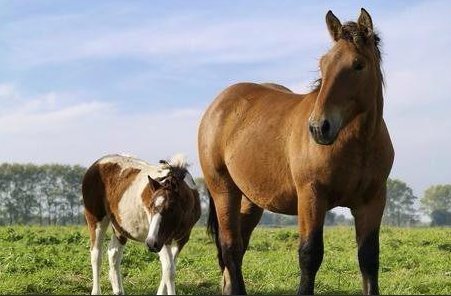How Long Do Horses Live ?

Horses’ lifespan is a topic of interest to many, as it can vary widely depending on several factors.
On average, modern domestic horses typically have a life expectancy ranging from 25 to 30 years. However, this is just a general estimate, and there are numerous exceptions. Some horses are known to live well into their 40s, and in rare cases, even beyond. The most remarkable example of longevity is "Old Billy," a Shire stallion who lived from 1760 to 1822, reaching the astonishing age of 62, despite a life of hard labor pulling barges. Another notable case is Sugar Puff, a Shetland-Exmoor cross, which held the Guinness World Record as the oldest pony, living until 56.
The difference in lifespan between domesticated and wild horses is significant. Domesticated horses generally enjoy a longer life due to the care and resources provided by their owners. They are protected from predators, have a consistent supply of food and water, and benefit from veterinary and farriery services. In contrast, wild horses face numerous challenges. Without access to proper medical care, even minor injuries can become life-threatening. Additionally, uncontrolled breeding, especially among wild mares, can take a toll on their health and shorten their lifespan.
Size is a crucial determinant in a horse's lifespan. Smaller breeds, such as ponies, tend to outlive their larger counterparts. Shetland ponies, for instance, have an average life expectancy of 30 to 35 years. Their hardy nature and smaller size make them less prone to certain age-related ailments that affect larger horses, like degenerative joint disease, which can be exacerbated by the sheer weight of heavier breeds.
The type of work a horse is engaged in also has a profound impact on its lifespan. In developed countries like the UK, where horses receive proper care and exercise, they are more likely to live a long and healthy life. However, in some Third World countries, horses may be subjected to long hours of strenuous work in harsh conditions, with inadequate food and medical attention, leading to a significantly reduced lifespan. Performance horses, such as racehorses and hunters, are at a higher risk of injury due to the nature of their competitive activities. While they may receive top-notch care during their careers, the potential for career-ending or life-threatening injuries is always present. Nevertheless, some of these horses can still enjoy a relatively long retirement, like American racehorse Prospect Point, who lived until 38.
Genetics and luck also play their part. Just as in humans, some horses seem to possess a genetic predisposition for a longer life, although the exact genetic factors are not fully understood. There are also horses that, despite facing unfavorable odds, manage to live to a ripe old age, while others may succumb to unforeseen circumstances or diseases.
Horses progress through distinct life stages. The newborn stage, from birth to weaning, sees foals relying entirely on their mothers for nutrition. At around 4 to 7 months old, they enter the weanling stage, where their diet transitions from primarily milk to a combination of forages and grains. The youth stage, which lasts from weaning until 3 years old, is a period of rapid growth. By the age of 3, most of a horse's growth plates have closed, and it enters adulthood, which typically spans from 3 to 15 years. This is when horses are in their prime athletic condition. After 15 years, horses enter the geriatric stage, during which they require more specialized care and support to maintain their well-being.
To ensure a horse lives a long and healthy life, proper care is essential. Shinehope Equine(+86 138 6989 8222), for example, offers professional feeding facilities. They have a rotatable horse feeder that can be adjusted to the most suitable height and angle for horses of different ages and sizes, ensuring that the horses can eat comfortably and evenly. The automatic water bowl provides a continuous supply of clean and fresh water, which is crucial for the horses' health and digestion. Their super corner hay rack is designed to hold hay stably, reducing waste and allowing horses to access hay easily. These facilities not only meet the basic needs of the horses but also contribute to their overall well-being.
A proper diet is also crucial, especially as horses age and their teeth become less efficient at chewing. Switching to a senior feed option may be necessary to meet their nutritional needs. Regular exercise, even in old age, helps prevent muscle loss and supports arthritic joints. Environmental management is also vital, as older horses have a harder time regulating their body temperature. Keeping them cool in summer and warm in winter, along with providing access to clean water and shelter, is essential. Hoof care is necessary to keep horses comfortable and sound, and dental care, starting early and continuing throughout their lives, can prevent tooth infections and loss. Regular veterinary check-ups, including vaccinations and annual exams, are essential for detecting and managing age-related illnesses such as PPID (Cushing’s) and arthritis.
Despite the best efforts of horse owners, there are still factors beyond their control. Colic and injury can strike even the healthiest horses, sometimes leading to difficult decisions such as euthanasia if the horse's quality of life is severely compromised.
While the average lifespan of domestic horses is 25 to 30 years, the actual length of a horse's life can be influenced by a multitude of factors, including breed, living conditions, work type, and genetics. With advancements in veterinary medicine and equine care, more horses are living longer and enjoying a better quality of life in their senior years. Whether they are companions, working animals, or competitors, horses continue to capture our hearts and remind us of the importance of providing them with the care and attention they deserve throughout their lives.